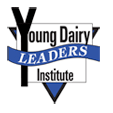 Last week, I had the opportunity to attend the seventh Young Dairy Leaders Institute in Albuquerque, New Mex. This two-year leadership program is sponsored by the Holstein Foundation and a nationally recognized three-phase leader and communication skills development program is designed for young adults (ages 22 to 45) working in the dairy industry, and represents all breeds of dairy cattle. Each participant develops top-tier skills and the personal network needed to succeed in today's dairy business. The four-day event had a variety of top-notch presenters. A brief outline of one presentation follows:
Last week, I had the opportunity to attend the seventh Young Dairy Leaders Institute in Albuquerque, New Mex. This two-year leadership program is sponsored by the Holstein Foundation and a nationally recognized three-phase leader and communication skills development program is designed for young adults (ages 22 to 45) working in the dairy industry, and represents all breeds of dairy cattle. Each participant develops top-tier skills and the personal network needed to succeed in today's dairy business. The four-day event had a variety of top-notch presenters. A brief outline of one presentation follows:Class members had a full day of media training. Joan Horbiak and David Pelzer of DMI (Dairy Management, Inc.) conducted the very participant-driven session where YDLI class members had to think on their feet when responding to questions that they are likely to be asked by consumers or the media. Joan and David prepared the group with key messages to share about the dairy industry and encouraged them to provide examples from their own operations.
The group was then transported to the local University to conduct some "on the street" interviews with consumers. The group was really surprised to learn what consumers know (or better – did not know) about dairy operations and dairy products. Some of the key messages the small groups shared with these consumers were:
"America's dairy farmers are committed to providing you with a safe, high-quality milk and dairy products. Our commitment to quality means taking good care of our cows and the land."
If consumers questioned the ownership of farms, the response to the consumer was something along these lines…"According to US Department of Agriculture, 98 percent of US dairy farms are family owned and operated, sometimes by multiple generations of the family."
If consumer were asking about farm size, the commonly heard response was "Dairy farms have modernized and become larger to allow siblings, children, or other family members to join the operation."
While the intent is not to have phrases that are repeated verbatim, the key components are the most important. And, with added information about the producer's own farm, it provides the uninformed consumer with facts and a personal connection. Other topics discussed were food safety, environment, animal care, and health and wellness.
You can learn more about "Telling Your Story" at www.dairycheckoff.com and www.dairyfarmingtoday.org
For more information on YDLI, visit www.holsteinfoundation.org.








